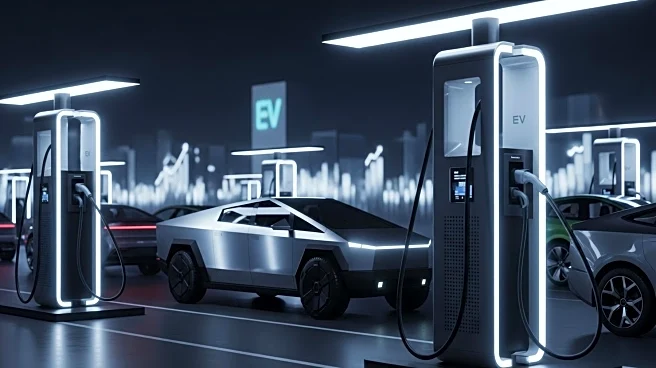What's Happening?
Tesla is experiencing a significant decline in sales of its Cybertruck model, with only 5,385 units sold in the third quarter of 2025, marking a 63% decrease compared to the same period in 2024. This downturn comes despite a general increase in electric vehicle sales, which rose by 40.7% from the previous quarter. The expiration of federal EV tax credits has spurred a rush in EV purchases, yet the Cybertruck has not benefited from this trend. Other electric trucks, such as the Rivian R1T and Ford F-150 Lightning, have seen sales increases, contrasting with the Cybertruck's performance. Additionally, Tesla faces legal challenges as families of victims in a Cybertruck crash are suing over alleged faulty door handles.
Why It's Important?
The decline in Cybertruck sales is significant for Tesla as it highlights challenges in maintaining consumer interest in this particular model amidst a booming EV market. The situation underscores potential issues with the Cybertruck's design and market positioning, especially as competitors like Rivian and Ford report sales growth. The legal issues surrounding the Cybertruck could further impact Tesla's reputation and consumer trust. This development may influence Tesla's strategic decisions regarding product offerings and market focus, potentially affecting its overall market share in the electric vehicle industry.
What's Next?
Tesla may need to reassess its strategy for the Cybertruck, possibly considering design improvements or marketing adjustments to boost sales. The company might also face increased scrutiny and pressure to address safety concerns raised by the ongoing lawsuit. As the EV tax credit expiration impacts sales, Tesla will likely focus on adapting to changing consumer preferences and regulatory environments. The outcome of the legal case could have implications for Tesla's liability and future product safety standards.
Beyond the Headlines
The decline in Cybertruck sales could reflect broader consumer trends and preferences in the EV market, where design, functionality, and brand reputation play crucial roles. Tesla's approach to handling the legal challenges and sales slump may set precedents for how automakers address safety concerns and market competition. The situation also highlights the importance of innovation and adaptability in maintaining a competitive edge in the rapidly evolving automotive industry.









